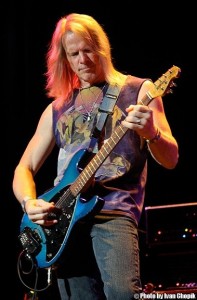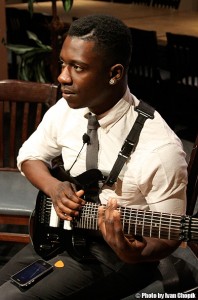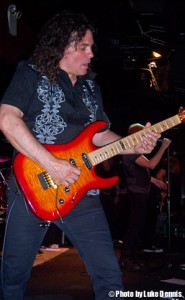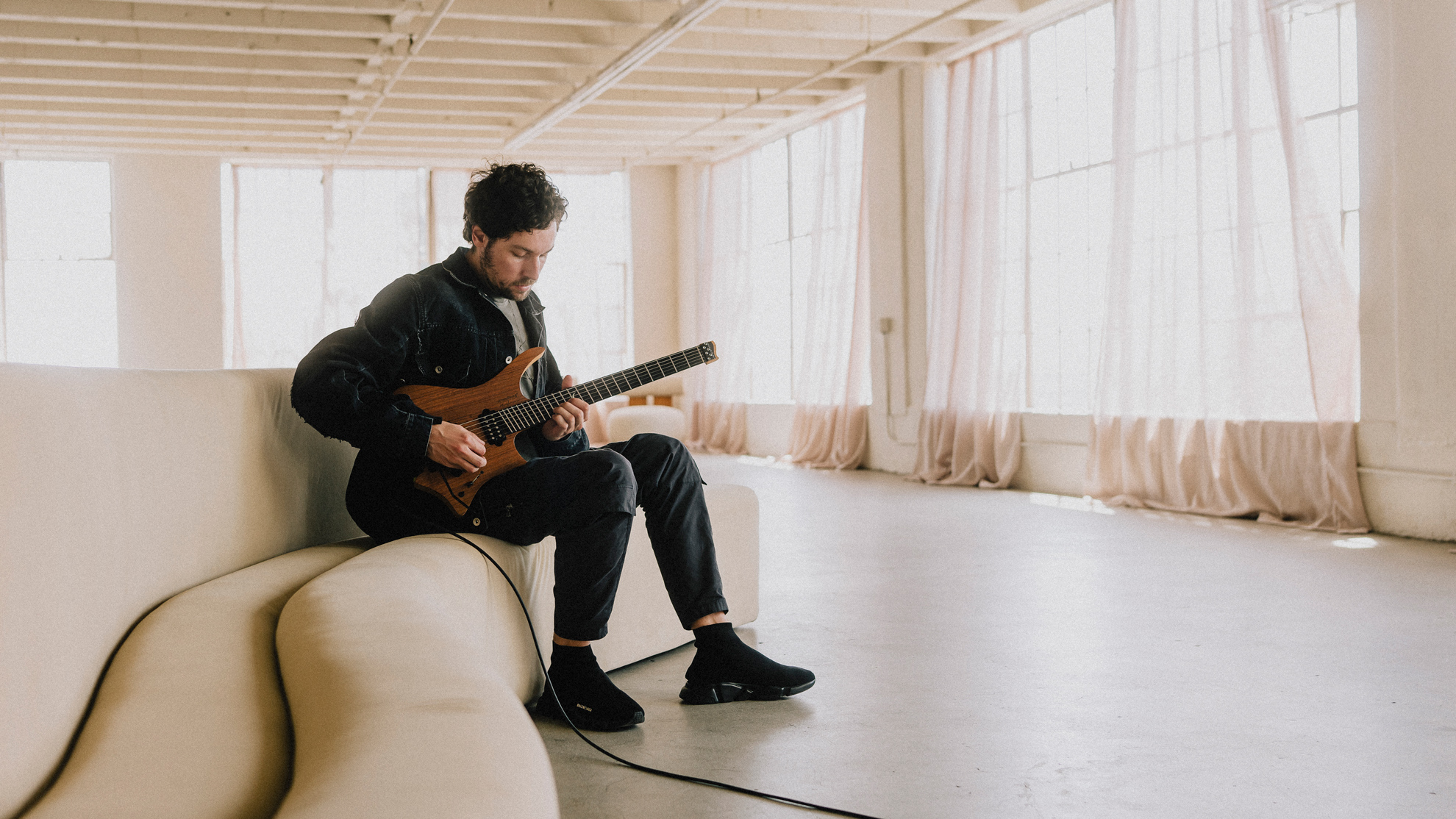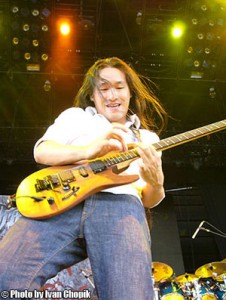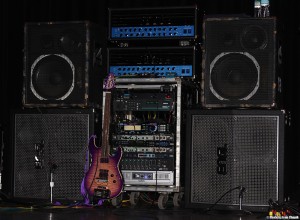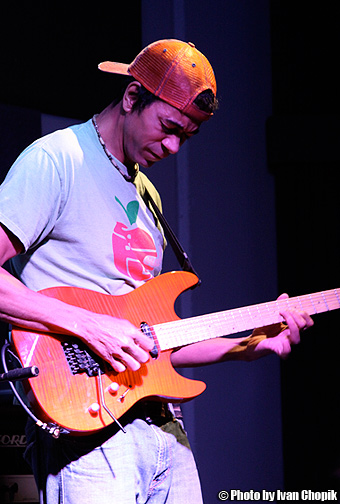 Guitar legend Greg Howe was one of the leaders of the virtuoso guitar movement of the 80’s, but soon thereafter he set himself apart from other shredders by developing his unique jazz-fusion style. Nowadays, besides being a producer and teacher, he is also one of the top session players out there, playing with acts such as Michael Jackson, Enrique Iglesias, N’Sync, and Justin Timberlake. In addition, Greg has been very active with his solo career. Extraction, his latest album (featuring Victor Wooten and Dennis Chambers) is a masterpiece definitely worth checking out.
Guitar legend Greg Howe was one of the leaders of the virtuoso guitar movement of the 80’s, but soon thereafter he set himself apart from other shredders by developing his unique jazz-fusion style. Nowadays, besides being a producer and teacher, he is also one of the top session players out there, playing with acts such as Michael Jackson, Enrique Iglesias, N’Sync, and Justin Timberlake. In addition, Greg has been very active with his solo career. Extraction, his latest album (featuring Victor Wooten and Dennis Chambers) is a masterpiece definitely worth checking out.
IC: What are your current projects?
GH: I’m working on an album that will feature Stanley Clark and Dennis Chambers and I’m hoping that that will be done before the summer. Another project that I’m working on is developing this online lesson website…. I think even before that gets done we’re gonna start off giving realtime webcam lessons. We’re getting a big request for that. Also, I’ve just relocated to southern California and I’ve just gotten involved with John Suhr and that organization. So we’re putting together things that are gonna involve me going out and doing a lot of clinics and stuff like that. I’m also teaching at Tone Merchants.
IC: Let’s talk about your latest album Extraction, which you recorded with Victor Wooten and Dennis Chambers. While the result is excellent, I understand you had some trouble getting this one out. Can you elaborate on that?
GH: Sure. Basically what happened was, the whole thing began in 2001. I was just getting ready to go out and do the sideman thing with the band N’Sync… and so I believe that was February or January and Mike Varney wanted to (he’s the owner of the record label) have me record Dennis [Chambers, Drummer] around the time that I was leaving and I told him that because of the fact that it was last-minute and because I couldn’t really do that, it would be better to just record this album as soon as I get back (which would have been in September). He really didn’t want it to be like that. He wanted me to try to record the drums before I left. Then while I was rehearsing in Florida with the band N’Sync he wanted me to simultaneously work on mixing these drums and recording to them in the hotel room… or find a studio down there.
It really seemed like a crazy request. …so of course I did try, but it didn’t work, because really there’s no way it could have worked. So to make a long story short, Dennis ended up recording his drums to tracks that I had done as reference tracks on a drum machine…. So he recorded his drums in the studio in Baltimore and I wasn’t even there. I was in Florida while he was recording. Which is weird… Dennis is amazing and he is one of my favorite drummers out there, but still [when] someone is recording on a record where I wrote the songs I want to be there on ideas and to able to just clarify what feel I want on certain parts and sometimes it’s not that defined so we gotta have some dialogue.
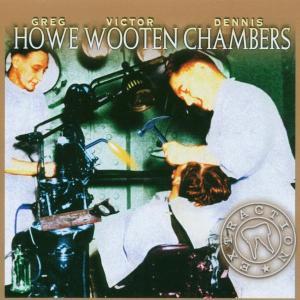
So when I got the drums back, first of all I really wasn’t happy with the quality of the recordings. I don’t know what it was. Dennis still says that the drums sounded great and actually I’ve heard the drums on his system and they do sound really good, but whatever I got sent to me from Baltimore sound quality-wise just wasn’t happening. And then performance-wise there were things that of course were amazing, but in some cases they weren’t what I was looking for.
But I tried to live with it and finally at the end of … 2001 I got the tracks, finally, from Victor [Wooten, Bassist] and we had a lot of problems with those tracks, because it was a different format that he had recorded on. I think he recorded a lot of the stuff on a VS-880 and then in Baltimore those drums had been done I think in Pro Tools and I was using the Nuendo thing. We had a lot of problems with lining up these wav files and making stuff sync up. And I especially had problems with Victor. That was really weird. I’d line him up and he’d start off with the band and then two minutes into it he’d be drifting ahead of the group or behind the drums or whatever.
IC: Doesn’t sound much like Victor.
GH: No, it definitely does not sound like Victor. So then I had to get in there and do all this time-stretching and try to place the wav up and spread it out and make it sound like it worked. So between that and trying to get the drums to sound good and kind of make these performances that really were never really done together and not recorded on the same format sound like they were done together and sound like they were recorded within the same format was such a ridiculous task and I really wasn’t getting it. It was taking months and months just to get one song to sound at least up to my standards.
And then as time went on I knew that people were expecting the record to be really, really good. People were already starting to get aggravated that it wasn’t out. I figured the more time goes on the better it has to be. You know what I mean? It was Catch-22, because the more time that goes on, the more I felt the record had to be that much better.
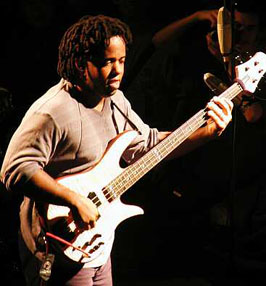
Bass Virtuoso Victor Wooten
In the middle of this I was going back and forth out on the road with N’Sync. I sort of did their last album, did their last tour, but then Justin Timberlake went out and did his own thing and they wanted me to go out and play guitar with them and I did at first and then I actually walked off of that tour. I walked off of it because it was too much to try to finish this record and do that simultaneously. And plus I was actually sort of getting a little tired of doing that. But having to finish the record was actually a good excuse for me to leave. I had to do it and what I actually ended up doing finally was I called Mike Varney at the record label and I just said ‘If we’re gonna do this record, let’s re-cut it, let’s just re-record it, let’s do this the right way, the way we should have done it a year and a half ago. Let’s make it the real thing.’
IC: So you actually re-recorded the whole album then?
GH: Yeah. Dennis came back up to the studio up in my area, which at that time was in Pennsylvania, and I had a really serious engineer come down with really nice equipment and [mic preamps] and we recorded his drums and then I actually flew down to Nashville and brought those tracks with me to Victor and recorded him. So we didn’t record together actually still because it was difficult to get everyone together, but I was at least there playing the guitar with Dennis when he recorded his drums so we could really feel each other together. And plus I could monitor whether or not I really was cool with what he was playing. Then when we went down to Nashville I was there with the drums that I’ve already approved of listening to him [Victor Wooten] play to those drums so I knew that doing it that way was going to be cool.
And then funny thing about it was that with all that time that went on with trying to get the album to be right the first time, which was almost two years, the second time, when I told the record company that we have to start over again, it was a five week process from the time that Dennis came up to record the tracks ‘till the album was mixed. It took five weeks total. If we had done it right the first time, he would have gotten his album way sooner if he had just waited for me to get home from the N’Sync tour. The thing was crazy. … it was one of the most stressful times of my career that I can remember. I felt like the record had to be great … it [would be] really weird to have it not sounding the way I thought it should.
IC: I really enjoyed the songwriting on this album. We’ve come to expect amazing solos from Greg Howe, but it seems that even without the crazy musicianship and things like that, the songs really hold up on their own.
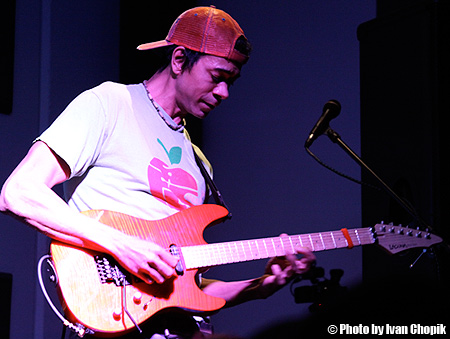 GH: Oh man, thank you so much. I appreciate that. That’s huge to hear that because that is really the goal. I’ve said it a lot of times, I like the idea of having these great players on these records and taking the burden off of me, because as much as it is fun sometimes to get crazy on the guitar, I really wanna make music that affects people and moves people, and touches them. And I want to know that if I walk off stage and the band is still playing, that the people are still digging the music.
GH: Oh man, thank you so much. I appreciate that. That’s huge to hear that because that is really the goal. I’ve said it a lot of times, I like the idea of having these great players on these records and taking the burden off of me, because as much as it is fun sometimes to get crazy on the guitar, I really wanna make music that affects people and moves people, and touches them. And I want to know that if I walk off stage and the band is still playing, that the people are still digging the music.
I hear a lot of musicians who write music where really if it weren’t for their soloing, there wouldn’t be anything much interesting going on there. To me, a song has to be good without me even in it. I wanna be able to enjoy the song even if I’m not playing the guitar. So the guitar for me is more like icing on the cake. So I think there’ll be more of that in the future, even more composition.
IC: I really dig the overall sound of Extraction and your tone in general, especially from the album “Hyperacuity” onward. What kind of equipment do you use?
GH: In the past, almost everything that I did was with these modified Fender Dual Showmans (the late 80’s models that came out with the red knobs). And I had a friend back in Pennsylvania that used to modify them and basically I don’t know what he did, but he sort of replaced the gain stage with something that was a little cooler and he also did some kind of bass mod that made the bass a lot tighter. Otherwise, I’d have a Tubescreamer in front of everything. That is really the main part of the sound.
But now, John Suhr has designed an amp for me that really is cool. It’s the first amp that I’ve played through ever where I don’t need my Tubescreamer. We’re gonna be doing a signature guitar and a signature amp, which should be I think available by mid 2006, probably summer of 2006. Now that’s what I’m using, but in the past… I have a couple of Marshalls that I’ve used, but for the most part it’s been that Dual Showman. And actually, “Hyperacuity” was a Johnson amplifier, which is like a Line6 kind of thing, an amp-modeler amp.
IC: You mentioned that you switched to Suhr guitars. Why the change from ESP?
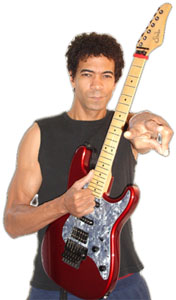 GH: Nothing against ESP, I think they make great guitars. I just think that direction-wise I’m just going somewhere that that’s a little bit different than where they’re at. John Suhr is an artist. Honestly, I’ve watched him work, he’s reminds me of me, he won’t let a guitar leave the factory without him tweaking it. He hears things that we don’t hear. He’ll tap on the wood … and he’ll say ‘This particular piece of wood isn’t working with this neck, because the woods don’t resonate right together.’ He’s like crazy, kind of. But the guitars are so serious and the quality is so incredible.
GH: Nothing against ESP, I think they make great guitars. I just think that direction-wise I’m just going somewhere that that’s a little bit different than where they’re at. John Suhr is an artist. Honestly, I’ve watched him work, he’s reminds me of me, he won’t let a guitar leave the factory without him tweaking it. He hears things that we don’t hear. He’ll tap on the wood … and he’ll say ‘This particular piece of wood isn’t working with this neck, because the woods don’t resonate right together.’ He’s like crazy, kind of. But the guitars are so serious and the quality is so incredible.
Them being a smaller company gives me access to them where we have ability to interact and talk…, [and I can] play the guitar while he’s tweaking things. For instance, when he came up with this amp for me, literally, I was sitting there playing guitar and he would listen to it for 15 minutes, get my comments, he’d take the amp, get in there with a soldering iron again, and plug me back in. We just hung out all day and did that. And those are the kind of things that I can’t get sometimes with these bigger companies that don’t have the time…
IC: Can you tell us a bit about the signature guitar that you have coming out? It is a Strat-type guitar with a Floyd Rose bridge?
GH: Yeah. Currently they’ve got the silent single-coil system that they’ve implemented and it’s amazing. I mean, it’s single coils for real that don’t make noise. And they’re honestly single-coils, (it’s not like simulated single-coils), that don’t make noise. … the problem is there’s this big coil winding that has to go in the body of the guitar, so it takes up a lot of space. And I still like to use a locking tremolo system (I know a lot of guys just don’t use it anymore, but I just can’t keep a guitar in tune unless I’ve got it locked). It’s difficult to have [the silent single-coil system] in there with the Floyd Rose, because the Floyd Rose requires taking out a lot of wood from the guitar, and that thing requires taking out a lot of wood from the guitar. But they didn’t actually put one together for me [yet].
The version that I’m using right now is front-loaded, meaning that everything is wired to the pickguard, but that is not gonna be the case with the signature model. I like to have the pickups screwed directly into the wood and not be just glued on to the pickguard. I think for the most part it’ll be a fairly simplistic guitar, but the foundation of it will be 24 frets, always a maple neck…, Strat-style, and Floyd Rose.
IC: Maple is the way to go for you?
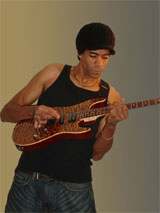
GH: Yeah, always. For some reason that tone is … more direct, it’s a little bit clearer to me. A lot of people sat that maple is brighter, but to my ears it’s brighter in an upper-mid way, not really in a full way. To me, rosewood fretboard is darker in the midrange, but brighter in the upper frequencies, like above 3k…. I really like that loud mid clarity, that glassy kind of sound.
IC: On Extraction and your other albums you weave smoothly through complex chord changes. How do you approach playing over changes? Do you improvise or do you write solos out beforehand?
GH: It’s a combination of both. Honestly, I don’t consider myself that good at playing through changes, so Extraction was hugely challenging for me in that I wanted to that, I set out to do it, and I set out to write songs that would allow me to do that. And I had the luxury of being able to play through those changes time and time again to make it feel like I’m really good at that (laughs).
But I don’t feel like I’m Mike Stern or Allan Holdsworth or John Scofield, where I could do that that comfortably, but I am working towards doing it that way. But yeah, I do work on it. I have a lot of different chord progressions and grooves and sometimes when I have free time I’ll just sit there and sort of blow over that for a while and things start to click and things start to fall together a little bit more. But I wouldn’t consider myself great a doing that quite yet, but I think I will be.
IC: Do you still have regular practice sessions that you still do nowadays?
GH: It’s really hard to. Sometimes you set out to do it and then what happens is you get a phone call or you get some situation that comes up or some last-minute scheduling things changes. So if I can get a good two hours of practice in on a fairly consistent basis, I feel pretty good about it. And the other problem with me is I don’t have a really good practice regimen. I don’t have like 15-minute [breaks], 15-minute warm-ups.
Generally, if I pick up a guitar and I know that I’ve got a couple of hours of free time to just play, I’ll just start playing things that I wanna hear. But I need to probably discipline myself a little more, so that I can get a little more out of the brief practice time that I have. But yeah, it’s hard to have a regular routine.
IC: I can imagine that, especially when you were starting out, you must have been doing a lot of shredding.
GH: Definitely. My history is that, when I was a teenager, I was a Van Halen fanatic. We’re looking at mid to late 70’s. And I was the first kid in school that could play “Eruption” and [other] Van Halen stuff. I was so blown away when I first heard him, because there was just nothing before that was even remotely close. I mean honestly, when I heard him play I didn’t really understand what it was that … it didn’t make any sense, I had to see it. I remember a bunch of us went out to a concert and saw him and as soon as I saw that song played, using the right hand on the fretboard, I was like ‘wow!… I can’t wait to try that.’ That was huge for me. He was a gigantic influence – especially in the beginning, when I was developing.
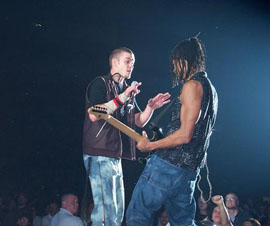
Greg Howe with pop star Justin Timberlake
I probably started off more with the desire to have all these crazy techniques and then slowly I was introduced to the Robben Ford and Mike Stern type of players over the years throughout the 80’s, 90’s. That’s where my focus on just making cool music started to develop. I think with a lot of people when they are young it’s about trying to blow people ’s minds with technique.
IC: You’ve played with the biggest names in Pop. Enrique Iglesias, N’Sync, the king of Pop – Michael Jackson. What’s it like to be going back and forth from playing this kind of music to styles like Fusion, Jazz, Neoclassical, etc? Are there certain adjustments you have to make?
GH: Sometimes, yeah… a lot of people don’t understand that there’s a lot more to it than it seems. I’d be lying if I said that that [these gigs] were difficult, but what is difficult sometimes, is understanding how to quickly dial in the tones that are needed on these various songs. The music director I worked with a lot is really good at putting these things together. Groove was so important to him, the way that it felt was really important to him.
But that is a lot different than doing an instrumental album or doing something like that, because in my music there’s no rules, there’s no boundaries. No one’s saying that you’re not allowed to do that or that you’re gonna lose half your audience by putting that weird bridge in there that’s in odd time signature or something.
So in a certain way, I feel almost like it would be a lot tougher to be a successful pop artist, than it would to do what I do, because to be a able to write a song that sounds familiar, being the kind of chord changes that occur a lot of times, but still have it be a brand new, unique thing, I think is a lot more challenging than just having the free reign to do whatever you want like I do. There’s no limits… if I can imagine it, I can make it into a song. If I can think of it, then I use it.
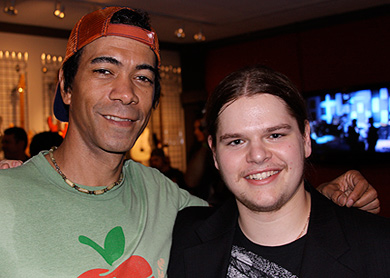
Greg Howe with Ivan Chopik in 2009
IC: What kind of stuff do you listen to nowadays?
GH: I listen to everything man. Honestly, my friends sometimes look at me like….they can’t believe the stuff that I listen to, because honestly I’m very much probably more inspired by pop even for my music than anything else. I listen to some weird stuff sometimes, but I’m more inspired [by non-obscure music], because weirdness comes so easy for me. It’s just more natural for me to think strange and think like an instrumental artist. I don’t really get that inspired from listening to Allan Holdsworth or listening to obscure music. I get more inspired listening to, you know, Jay-Z or listening to something that’s more pop-oriented and then implementing some of those concepts into my more abstract, crazy way of thinking.
IC: Any tips for aspiring guitarists around the world?
GH: Oh man, I’m sure there’s so many great players out there…. If you’re gonna do this, make sure your heart’s in it. Make sure that it’s something you really wanna do…. For me, I didn’t really pick music, I know it sounds corny, but music did pick me. It’s not like I even have a choice, it’s something I have to do. So I kind of think that if you’re gonna make it a career, then make sure that it’s sort of like that. That music is so much in your heart, that you just wouldn’t be complete without pursuing it.



